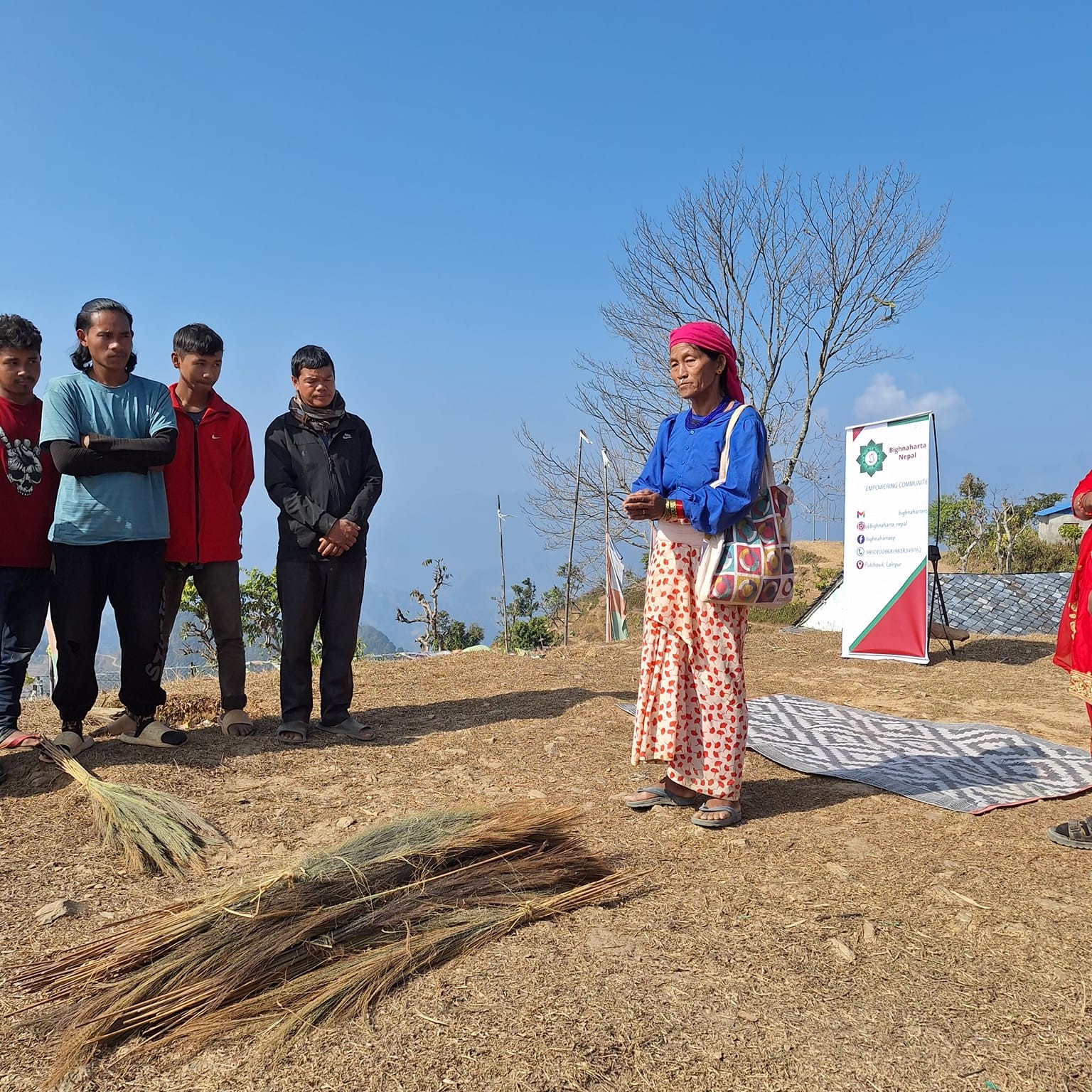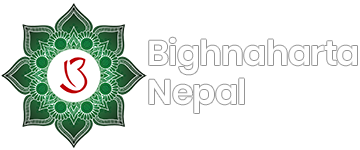
15thApr 24
- Rajiya Banu
Certified Trainer सुनमाया आमा
सुनमाया आमा अहिले ६३ वर्षको हुनु भयो। उमेर जति धेरै फ़ुर्तिलो र सक्रिय पनि त्यतिकै हुनुहुन्छ। ८ जना छोरी र २ छोराकि आमा एकल महिला हुन।
राक्सिराङ्गको माइसीराङबाट जिर्खेडाँडा बिहे गरेर आउँदा साढे १७ वर्षको हुनुहुन्थ्यो र साढे १८ बर्षमा नै बच्चा जन्माउनु भाको रे!
आमाको अनुसार उहाँको माइतीघर तिर २ जनालाई मात्र अम्रीसोको कुचो बनाउन आउने,आमाले उनीहरू सँग सिक्न खोज्दा नसिकाए पनि उनीहरूले बनाएको देखेर नै कुचो बनाउने तरिका सिक्नु भएछ,अझ भनौ अझै राम्रो बनाउन आफै सिक्नु भएछ।
उहिले गाउँमा अहिले जस्तो व्यावसायिक रूपमा अम्रिसो खेती हुँदैनथ्यो । जङ्गलमा गएर अम्रिसो थुतेर ल्याइ कुचो बनाउन पर्थ्यो अनि घरमा नुन तेल आवश्यक पर्दा त्यही कुचो बेचेर गर्जो टारिन्थ्यो। त्यति बेला एउटा कुचो १० रुपैयाँमा बिक्न पनि धौ धौ हुन्थ्यो रे!
२०७६ सालमा विघ्नहर्ता नेपालले अम्रीसोको व्यवसायिक खेती गरे लगत्तै गाउँमा कुचो बुन्ने तालिम सञ्चालन गर्दा थाहा भयो आमा त आफ्नो गाउँमा कुचो बुन्न सिकाउने पहिलो महिला हुनुहुँदो रहेछ । जसले जिर्खेडाँडाका महिलाहरूलाई पनि कुचो बुन्न सिकाएर घरखर्च टार्न सहयोग गर्नु भयो रे !
आमा कुचो बुन्न मात्रै हैन,अन्य चेपाङ समुदायका परम्परागत हाते बुनाइका सिपहरूमा पनि खप्पिस हुनुहुन्छ। जाबी, राडी, पाखी, मान्द्रो, डोको, डालो, नाम्लो पनि मज्जाले बुन्न आउँछ।
बर्षौ देखि गरीबी र अभावमा आमाले यी सबै कामहरु गर्नु भयो,अब भने गरिबी ढाक्नको लागि सिकेको सिप उहाँको पहिचान बन्नु पर्छ। यस्ता परम्परागत सिपलाइ उध्यमसङ्ग जोड्नु पर्छ।
नेपाल सरकारको तथ्यांक अनुसार नेपालमा आर्थिक क्रियाकलापमा सक्रिय महिलाको ८२% स्वरोजगार छन र १२% ज्यालादारी गर्छन भने ४% भन्दा बढी महिलाहरु बिना ज्याला घरायसी काम
गरिरहेका छन।
विघ्नहर्ताले यसै वर्ष देखि आमालाइ खोरियाको कुचो बनाउन चेपाङ समुदायको ‘सर्टिफाइड ट्रेनर’( Certified Trainer) बनाइ गाउँ गाउँमा तालिमको लागि पठाइरहेको छ। आमा जस्तै सिप भएका तर अवसर र बजार नपाएका महिलालाई बजारसँग जोडी आर्थिक रूपमा सबल बनाउने अभियानमा जोडेको छ।
बिघ्नहर्ता नेपाल र आमाहरु जस्ता महिला मिलि गाउँका महिलाहरुलाई परम्परागत पेशामा सक्रिय बनाउने, दिनरात काममा खटिने महिलाहरुको जिवनस्तर सुधार गर्ने, उहाँहरुको नेतृत्व बिकास र समाजिकीकरण गरि स्वरोजगार बनाउन जोड्तोडले लागि परेको छ।
एक महिला आफू मात्र ससक्त नभइ आफू जस्तै अरु महिला ससक्त बनाउन सक्नु नै महिला ससक्तिकरणको राम्रो उदाहरण हो र सुनमाया आमा उदाहरण हुन।
------------------
Sunmaya Aama is now 63 years old. As much as her age has advanced, her energy and activeness remain just as strong. She is a single mother of eight daughters and two sons.
When she came to Jirkhedanda from her maternal village Maisirang in Raksirang after marriage, she was just 17 and a half years old. She gave birth to her first child at the age of 18 and a half. According to her, back in her maternal village, only two people knew how to make brooms from amriso (broom grass). Although they didn’t teach her, she learned just by watching them. In fact, she taught herself how to make even better brooms.
Back then, amriso was not cultivated commercially like it is today. One had to go to the forest, gather the grass, and then make brooms at home. If salt or oil was needed at home, she would sell the brooms to cover the expense. At that time, even selling one broom for 10 rupees was difficult.
In 2019 (2076 B.S.), after Bighnaharta Nepal introduced commercial amriso farming in the village and conducted broom-making training, it was discovered that Sunmaya Aama was actually the first woman in her village to teach broom-making. She had already been teaching the women of Jirkhedanda how to make brooms and support their households.
But she doesn’t just make brooms—she is also skilled in other traditional Chepang handicrafts. She can expertly weave jabi, radi, pakhi, mandro, doko, dalo, and namlo.
For years, she carried out all this work to survive poverty and hardship. Now, the skills she once used out of necessity should become her identity. These traditional crafts need to be connected with enterprise.
According to Nepal government statistics, 82% of economically active women in Nepal are self-employed, 12% are wage workers, and over 4% do unpaid domestic work.
Starting this year, Bighnaharta Nepal has certified Sunmaya Aama as a “Certified Trainer” for Khoriya brooms and has been sending her to villages to lead training programs. The initiative aims to connect women like her—skilled but lacking access and market opportunities—with economic empowerment.
Bighnaharta Nepal and women like Sunmaya Aama are working hand-in-hand to engage rural women in traditional occupations, improve the lives of women who tirelessly work day and night, develop their leadership and social inclusion, and make them self-reliant.
A woman who empowers not only herself but also others like her is a true example of women’s empowerment—and Sunmaya Aama is that example.
राक्सिराङ्गको माइसीराङबाट जिर्खेडाँडा बिहे गरेर आउँदा साढे १७ वर्षको हुनुहुन्थ्यो र साढे १८ बर्षमा नै बच्चा जन्माउनु भाको रे!
आमाको अनुसार उहाँको माइतीघर तिर २ जनालाई मात्र अम्रीसोको कुचो बनाउन आउने,आमाले उनीहरू सँग सिक्न खोज्दा नसिकाए पनि उनीहरूले बनाएको देखेर नै कुचो बनाउने तरिका सिक्नु भएछ,अझ भनौ अझै राम्रो बनाउन आफै सिक्नु भएछ।
उहिले गाउँमा अहिले जस्तो व्यावसायिक रूपमा अम्रिसो खेती हुँदैनथ्यो । जङ्गलमा गएर अम्रिसो थुतेर ल्याइ कुचो बनाउन पर्थ्यो अनि घरमा नुन तेल आवश्यक पर्दा त्यही कुचो बेचेर गर्जो टारिन्थ्यो। त्यति बेला एउटा कुचो १० रुपैयाँमा बिक्न पनि धौ धौ हुन्थ्यो रे!
२०७६ सालमा विघ्नहर्ता नेपालले अम्रीसोको व्यवसायिक खेती गरे लगत्तै गाउँमा कुचो बुन्ने तालिम सञ्चालन गर्दा थाहा भयो आमा त आफ्नो गाउँमा कुचो बुन्न सिकाउने पहिलो महिला हुनुहुँदो रहेछ । जसले जिर्खेडाँडाका महिलाहरूलाई पनि कुचो बुन्न सिकाएर घरखर्च टार्न सहयोग गर्नु भयो रे !
आमा कुचो बुन्न मात्रै हैन,अन्य चेपाङ समुदायका परम्परागत हाते बुनाइका सिपहरूमा पनि खप्पिस हुनुहुन्छ। जाबी, राडी, पाखी, मान्द्रो, डोको, डालो, नाम्लो पनि मज्जाले बुन्न आउँछ।
बर्षौ देखि गरीबी र अभावमा आमाले यी सबै कामहरु गर्नु भयो,अब भने गरिबी ढाक्नको लागि सिकेको सिप उहाँको पहिचान बन्नु पर्छ। यस्ता परम्परागत सिपलाइ उध्यमसङ्ग जोड्नु पर्छ।
नेपाल सरकारको तथ्यांक अनुसार नेपालमा आर्थिक क्रियाकलापमा सक्रिय महिलाको ८२% स्वरोजगार छन र १२% ज्यालादारी गर्छन भने ४% भन्दा बढी महिलाहरु बिना ज्याला घरायसी काम
गरिरहेका छन।
विघ्नहर्ताले यसै वर्ष देखि आमालाइ खोरियाको कुचो बनाउन चेपाङ समुदायको ‘सर्टिफाइड ट्रेनर’( Certified Trainer) बनाइ गाउँ गाउँमा तालिमको लागि पठाइरहेको छ। आमा जस्तै सिप भएका तर अवसर र बजार नपाएका महिलालाई बजारसँग जोडी आर्थिक रूपमा सबल बनाउने अभियानमा जोडेको छ।
बिघ्नहर्ता नेपाल र आमाहरु जस्ता महिला मिलि गाउँका महिलाहरुलाई परम्परागत पेशामा सक्रिय बनाउने, दिनरात काममा खटिने महिलाहरुको जिवनस्तर सुधार गर्ने, उहाँहरुको नेतृत्व बिकास र समाजिकीकरण गरि स्वरोजगार बनाउन जोड्तोडले लागि परेको छ।
एक महिला आफू मात्र ससक्त नभइ आफू जस्तै अरु महिला ससक्त बनाउन सक्नु नै महिला ससक्तिकरणको राम्रो उदाहरण हो र सुनमाया आमा उदाहरण हुन।
------------------
Sunmaya Aama is now 63 years old. As much as her age has advanced, her energy and activeness remain just as strong. She is a single mother of eight daughters and two sons.
When she came to Jirkhedanda from her maternal village Maisirang in Raksirang after marriage, she was just 17 and a half years old. She gave birth to her first child at the age of 18 and a half. According to her, back in her maternal village, only two people knew how to make brooms from amriso (broom grass). Although they didn’t teach her, she learned just by watching them. In fact, she taught herself how to make even better brooms.
Back then, amriso was not cultivated commercially like it is today. One had to go to the forest, gather the grass, and then make brooms at home. If salt or oil was needed at home, she would sell the brooms to cover the expense. At that time, even selling one broom for 10 rupees was difficult.
In 2019 (2076 B.S.), after Bighnaharta Nepal introduced commercial amriso farming in the village and conducted broom-making training, it was discovered that Sunmaya Aama was actually the first woman in her village to teach broom-making. She had already been teaching the women of Jirkhedanda how to make brooms and support their households.
But she doesn’t just make brooms—she is also skilled in other traditional Chepang handicrafts. She can expertly weave jabi, radi, pakhi, mandro, doko, dalo, and namlo.
For years, she carried out all this work to survive poverty and hardship. Now, the skills she once used out of necessity should become her identity. These traditional crafts need to be connected with enterprise.
According to Nepal government statistics, 82% of economically active women in Nepal are self-employed, 12% are wage workers, and over 4% do unpaid domestic work.
Starting this year, Bighnaharta Nepal has certified Sunmaya Aama as a “Certified Trainer” for Khoriya brooms and has been sending her to villages to lead training programs. The initiative aims to connect women like her—skilled but lacking access and market opportunities—with economic empowerment.
Bighnaharta Nepal and women like Sunmaya Aama are working hand-in-hand to engage rural women in traditional occupations, improve the lives of women who tirelessly work day and night, develop their leadership and social inclusion, and make them self-reliant.
A woman who empowers not only herself but also others like her is a true example of women’s empowerment—and Sunmaya Aama is that example.

